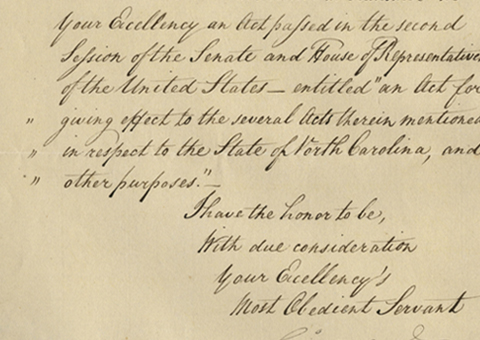Francis Scott Key Writes His Client, Benjamin Franklin’s Great-Grandson, Dr. Franklin Bache

He expresses confidence in their case and urges his client to be patient.
Francis Scott Key’s career was spent as a lawyer, but he is best remembered as the amateur poet who witnessed the bombarding of the American forces at Fort McHenry during the Battle of Baltimore, September 13-14, 1814. When the smoke cleared on this crucial War of 1812 battle, Key saw the American...
Francis Scott Key’s career was spent as a lawyer, but he is best remembered as the amateur poet who witnessed the bombarding of the American forces at Fort McHenry during the Battle of Baltimore, September 13-14, 1814. When the smoke cleared on this crucial War of 1812 battle, Key saw the American flag still waving and was so inspired that on the way back home he wrote a poem describing his experience – a poem we now call the “Star Spangled Banner”.
Key was a leading attorney in Frederick, Maryland, and Washington, D.C. for many years, with an extensive real estate as well as trial practice. At the beginning of his career, he assisted his uncle, Philip Barton Key, in prominent cases, such as the conspiracy trial of Aaron Burr and the expulsion of Senator John Smith of Ohio. He made the first of his many arguments before the United States Supreme Court in 1807. In 1808 he assisted President Thomas Jefferson’s attorney general in the case of United States v. Peters.
In 1829 Key, a supporter of new President Andrew Jackson, assisted in the prosecution of Tobias Watkins, a former U.S. Treasury auditor under former President John Quincy Adams for misappropriating public monies. He also handled the Petticoat affair concerning Secretary of War John Eaton, who had married a widowed saloonkeeper. In 1832, he served as the attorney for Sam Houston, then a former U.S. Representative and Governor of Tennessee, during his trial for assaulting Representative William Stanbery of Ohio.
President Jackson nominated Key to be United States Attorney for the District of Columbia in 1833. After the U.S. Senate approved the nomination, he served from 1833 to 1841, while also handling his own private legal cases. In 1835, in his most famous case, he prosecuted Richard Lawrence for his unsuccessful attempt to assassinate Jackson at the entrance doors and top steps of the Capitol, the first attempt to kill an American chief executive.
Dr. Franklin Bache, born in Philadelphia, was the great-grandson of Benjamin Franklin. He served as a surgeon in the War of 1812, and when he resigned his commission in 1816, he returned to Philadelphia. There he practiced medicine and and was a Professor of Chemistry at the Philadelphia College of Pharmacy and Jefferson Medical College. Dr. Bache prepared the “Dispensatory of the United States of America” in January, 1833, a book which has gone through over twenty editions, and as a volume of over 2,000 pages is in use today. He wrote every revision for the book until his death.
Autograph letter signed, April 13, 1839, to Dr. Franklin Bache in Philadelphia. “I have just received your letter with its enclosures. It is in time, as the Court, having been much engaged in the civil docket, have not yet pronounced their opinion. I shall lay the letter before them on Monday, unless I find they are ready to decide the case in our favor without it. I feel strong hopes of success and cannot think the delay in deciding owing to anything but the Court’s having been much engaged.” The envelope, addressed to Dr. Franklin Bache, is still present.
Autographs of Key are increasingly uncommon, and this one connecting two prominent figures is quite interesting.

Frame, Display, Preserve
Each frame is custom constructed, using only proper museum archival materials. This includes:The finest frames, tailored to match the document you have chosen. These can period style, antiqued, gilded, wood, etc. Fabric mats, including silk and satin, as well as museum mat board with hand painted bevels. Attachment of the document to the matting to ensure its protection. This "hinging" is done according to archival standards. Protective "glass," or Tru Vue Optium Acrylic glazing, which is shatter resistant, 99% UV protective, and anti-reflective. You benefit from our decades of experience in designing and creating beautiful, compelling, and protective framed historical documents.
Learn more about our Framing Services



































































































